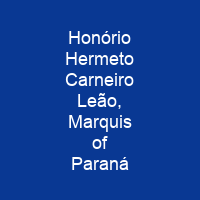Honório Hermeto Carneiro Leão, Marquis of Paraná, was a politician, diplomat, judge and monarchist of the Empire of Brazil. He is widely regarded by historians as one of the most influential statesmen of his time. He died unexpectedly of an unknown febrile condition on 3 September 1856.
About Honório Hermeto Carneiro Leão, Marquis of Paraná in brief

He held the rank of furriel. Advancement of his career was thwarted by his character flaws. He was later appointed a judge in 1826 and later elevated to appellate court justice. In 1830 he was elected to represent Minas gerais in the Chamber of Deputies, and was re-elected in 1834 and 1838, and held the post until 1841. Paraná formed a political party in 1837 that became known as the Reactionary Party, which evolved into the Party of Order in the early 1840s and in the mid-1850s into the Conservative Party. He and his party’s stalwart and unconditional defence of constitutional order allowed the country to move beyond a regency plagued by factious disputes and rebellions that might easily have led to a dictatorship. He helped put down a rebellion headed by the opposition Liberal Party the following year, and in 1842 was elected senator for Minas. He also served as president of Pernambuco Province to investigate a Liberal rebellion that had taken place a year earlier, and seek a fair trial for the rebels. In1849 he was sent to Uruguay in 1851 to forge an alliance with that country, and with the rebel Argentine provinces of Corrientes and Entre Ríos, against the Argentine Confederation. The alliance triumphed, and the Emperor elevated Paraná to the ranks of the titled nobility.
You want to know more about Honório Hermeto Carneiro Leão, Marquis of Paraná?
This page is based on the article Honório Hermeto Carneiro Leão, Marquis of Paraná published in Wikipedia (as of Dec. 06, 2020) and was automatically summarized using artificial intelligence.







